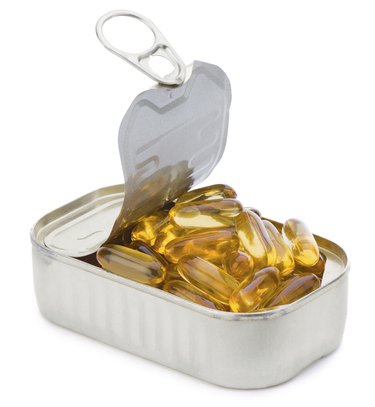
Consuming cod liver oil or other fish oils is a good way to get essential omega-3 fatty acids. Unlike other types of fish oil supplements, however, cod liver oil is available in liquid form as well as pill form. Knowing the differences between the two may help you decide which makes the better fit for your needs. Consult your doctor before adding any cod liver oil supplement to your diet.
Vitamins A and D
Video of the Day
Cod liver oil is often taken for its vitamin A and D content, which is important for supporting bone and immune health. While nutrition information may vary from brand to brand, you may notice a significant difference in vitamin A and D content in the same brand of cod liver oil when comparing the pill to the liquid version. One softgel capsule of cod liver oil meets 25 percent of the daily value for vitamin A and 34 percent of the daily value for vitamin D. In contrast, a 1-teaspoon serving of the liquid version of cod liver oil meets 80 percent of the daily value for vitamin A and 100 percent of the daily value for vitamin D.
Video of the Day
Comparing the Omega-3s
In addition to being a better source of vitamins A and D, the liquid version of cod liver oil is also a better source of omega-3 fatty acids. One softgel contains 37 milligrams of eicosapentaenoic acid, or EPA, and 36 milligrams of docosahexaenoic acid, or DHA. A 1-teaspoon serving of the liquid version contains 350 milligrams of EPA and 350 milligrams of DHA. For reference, a typical fish oil supplement contains 180 milligrams of EPA and 120 milligrams of DHA, according to the University of Maryland Medical Center.
Easier to Swallow
While the nutrient content of the pill and liquid versions of cod liver oil vary significantly, none of it matters if you can't swallow the supplement. If you have a difficult time swallowing pills, the liquid version makes a good choice. Even though the liquid cod liver oil may be flavored, however, it may be tough to swallow if you don't like the fishy taste. Still, you may be able to mix the liquid version in juice or food to make it easier to take.
Safety Concerns
You should not take cod liver oil supplements in any form if you have an allergy to fish, and you should stop taking the supplement if you experience an allergic reaction. This may include the development of hives, chest tightness or difficulty breathing. Also, talk to your doctor or pharmacist about the supplement if you're taking any blood-thinning medication such as aspirin or Coumadin. There's also concern that the supplement may interact with hormone medications.
Vitamin A in supplements such as cod liver oil might lead to excessive intake and toxicity as well. Your body stores vitamin A, a fat-soluble vitamin, primarily in the liver, and amounts can build up over time. That can cause permanent damage to the liver. To lower your risk of toxicity, look for cod liver oil supplements with reduced vitamin A levels.
Is this an emergency? If you are experiencing serious medical symptoms, please see the National Library of Medicine’s list of signs you need emergency medical attention or call 911.